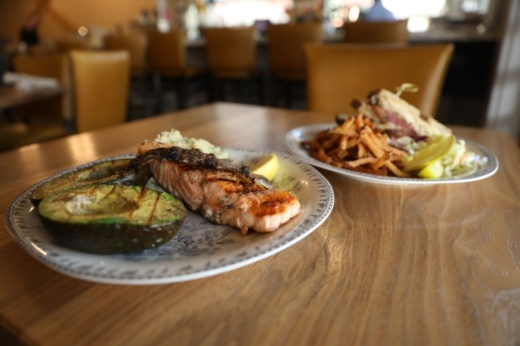“If you call me next [week], I [will] for sure have a different story because things will be different,” Jorg's Cafe Vienna owner Jorg Fercher said. “Every day, it is different.”
His 19-plus-year-old restaurant is a staple of downtown Plano, Jorg said, and changing to only to-go orders has been difficult for him in more ways than one.
A key part of his Austrian restaurant, he said, is the atmosphere, where guests come to talk and enjoy a meal. Guests have become regulars, and regulars have become friends, he said, and regulars are where roughly 90% of his typical business comes from.
“It's very hard right now to not see any of them and having an empty restaurant. ... But still, ... the whole thing with going out is to have a good time to talk to people,” Fercher said. “And that's what's all about.”
Jorg’s and other locally owned restaurants like it are in survival mode, doing their best to adjust as things change, Fercher said. Takeout orders are not a natural aspect of dining at Jorg’s, he said, because the food is typically made for guests as they come in, but it is what he is doing for now.
“You put your heart and soul and your life savings ... into it in a business, and you have it for two decades, and then, all of a sudden, it stops,” Fercher said. “But we roll up positive, and we're going to find a way, somehow, to go back where we stopped.”
Some restaurants with less to-go capabilities are weighing the possible impact of shutting down fully to help mitigate the spread of COVID-19, so that restaurants can open fully sooner, according to Jason Graman, managing partner and creator of Fork and Fire.
Casual dining establishments like Fork and Fire typically base 10% or less of their business on carryout or delivery food, Graman said, and an abrupt shift to 100% is not sustainable.
“If we tighten up fast and quick, the belabored little step—the next little step and the next little step—the little steps are meaningless,” Graman said. “But at some point in time, it's just not viable or realistic that we can go, you know, 60 days or 90 days doing this.”
Since Abbott’s order, Graman said, Fork and Fire has been innovating daily meal kits, ranging from fully cooked meals to uncooked protein with prepared sides.
To save money, Graman has prepared food on his own two days out of the week so far. This is more effective for labor, as typical restaurant business requires a kitchen staff to prep and cook the meals.
“I’m a little scrappier, in the sense that my kitchen and the design of my [restaurant] model was always economical from a workforce standpoint. But I can’t do that for very long,” Graman said.
He said he is looking at resources, like the disaster loans, but finding the time to understand and work through the paperwork is an issue for small businesses working around the clock, he said.
“For a guy like me,or even [a] slightly larger business, ... running the business and coming up with these plans and promoting them and working them and executing them at the same time—it's [hard] trying to navigate all the paperwork and requirements and filling out the applications and getting all this done,” Graman said. “There's a bandwidth issue. It's a lot for [a] small business to manage.”
Local restaurants with established takeout systems are also feeling the strain of moving to to-go only, Scotty P's owner Scott Pontikes said. Typically, 30% of its income comes from takeout orders, he said.
After Abbott's order, Scotty P’s began offering curbside pickup, expanding the third-party delivery services with which the restaurant partners and innovating family-pack meals with changing options. Soon, Pontikes said, grocery items may be added to food orders for additional meals for guests to make.
“It is just a constant [effort], moment to moment, minute to minute, trying to figure out, 'How do we help keep our people working? How do we safely prepare and get food to you?' ” Pontikes said. “Our concern as a family business is keeping the doors open for the long term.”
Pontikes said he has seen support from the community, city and chamber in the last week and expects his partnership with the community to continue as long as restrictions go on. He attributes this to the power of grassroots local business, Pontikes said.
Food is a comfort in hard times, he said, and it is something that he plans to continue making to comfort the community during this time and in the future.
“As [long as] I'm safely able to serve food and as long as this state, the city, the government, allows us to do so, there's no other option,” Pontikes said. “We will fight. We will fight until we just can't fight anymore. There's just no—I don't think there's an option.”





